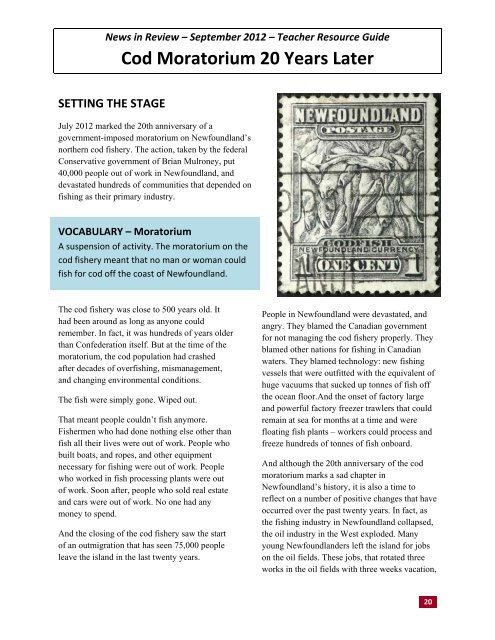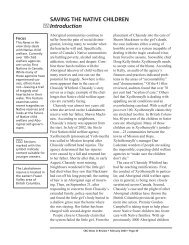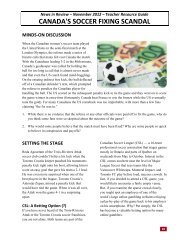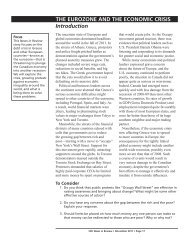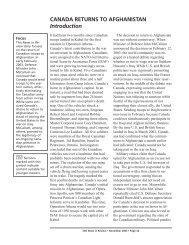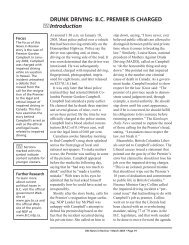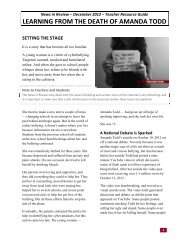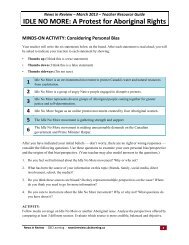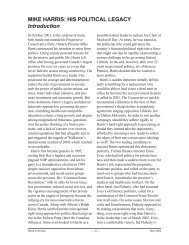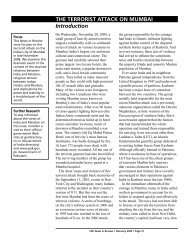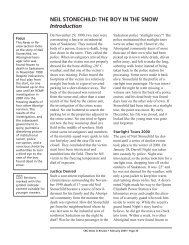Resource guide - News in review - CBC Learning
Resource guide - News in review - CBC Learning
Resource guide - News in review - CBC Learning
Create successful ePaper yourself
Turn your PDF publications into a flip-book with our unique Google optimized e-Paper software.
<strong>News</strong> <strong>in</strong> Review – September 2012 – Teacher <strong>Resource</strong> Guide<br />
Cod Moratorium 20 Years Later<br />
SETTING THE STAGE<br />
July 2012 marked the 20th anniversary of a<br />
government-imposed moratorium on Newfoundland’s<br />
northern cod fishery. The action, taken by the federal<br />
Conservative government of Brian Mulroney, put<br />
40,000 people out of work <strong>in</strong> Newfoundland, and<br />
devastated hundreds of communities that depended on<br />
fish<strong>in</strong>g as their primary <strong>in</strong>dustry.<br />
VOCABULARY – Moratorium<br />
A suspension of activity. The moratorium on the<br />
cod fishery meant that no man or woman could<br />
fish for cod off the coast of Newfoundland.<br />
The cod fishery was close to 500 years old. It<br />
had been around as long as anyone could<br />
remember. In fact, it was hundreds of years older<br />
than Confederation itself. But at the time of the<br />
moratorium, the cod population had crashed<br />
after decades of overfish<strong>in</strong>g, mismanagement,<br />
and chang<strong>in</strong>g environmental conditions.<br />
The fish were simply gone. Wiped out.<br />
That meant people couldn’t fish anymore.<br />
Fishermen who had done noth<strong>in</strong>g else other than<br />
fish all their lives were out of work. People who<br />
built boats, and ropes, and other equipment<br />
necessary for fish<strong>in</strong>g were out of work. People<br />
who worked <strong>in</strong> fish process<strong>in</strong>g plants were out<br />
of work. Soon after, people who sold real estate<br />
and cars were out of work. No one had any<br />
money to spend.<br />
And the clos<strong>in</strong>g of the cod fishery saw the start<br />
of an outmigration that has seen 75,000 people<br />
leave the island <strong>in</strong> the last twenty years.<br />
People <strong>in</strong> Newfoundland were devastated, and<br />
angry. They blamed the Canadian government<br />
for not manag<strong>in</strong>g the cod fishery properly. They<br />
blamed other nations for fish<strong>in</strong>g <strong>in</strong> Canadian<br />
waters. They blamed technology: new fish<strong>in</strong>g<br />
vessels that were outfitted with the equivalent of<br />
huge vacuums that sucked up tonnes of fish off<br />
the ocean floor.And the onset of factory large<br />
and powerful factory freezer trawlers that could<br />
rema<strong>in</strong> at sea for months at a time and were<br />
float<strong>in</strong>g fish plants – workers could process and<br />
freeze hundreds of tonnes of fish onboard.<br />
And although the 20th anniversary of the cod<br />
moratorium marks a sad chapter <strong>in</strong><br />
Newfoundland’s history, it is also a time to<br />
reflect on a number of positive changes that have<br />
occurred over the past twenty years. In fact, as<br />
the fish<strong>in</strong>g <strong>in</strong>dustry <strong>in</strong> Newfoundland collapsed,<br />
the oil <strong>in</strong>dustry <strong>in</strong> the West exploded. Many<br />
young Newfoundlanders left the island for jobs<br />
on the oil fields. These jobs, that rotated three<br />
works <strong>in</strong> the oil fields with three weeks vacation,<br />
20


